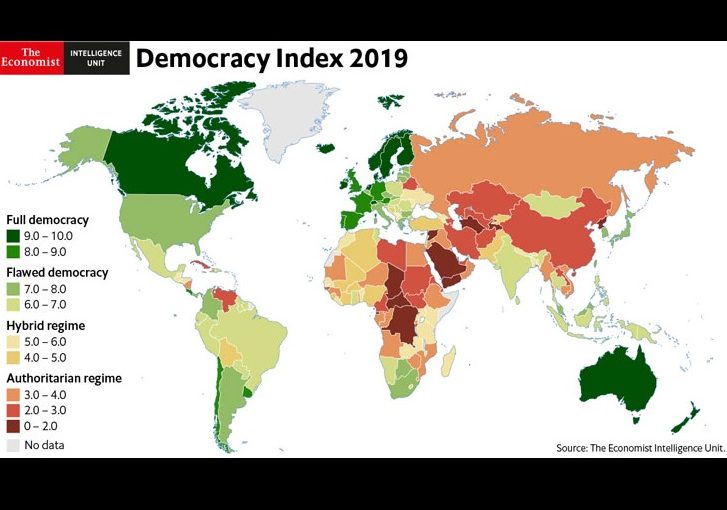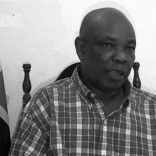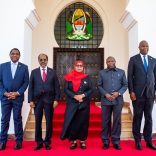Mozambique’s commitment to fighting the “martyrdom” of corruption is unequivocal – president
Democracy Index 2019: PALOP’s worst three – including Mozambique – remain in the lowest category

Image: EIU
Guinea-Bissau, Mozambique and Angola, in that order, are the worst of the PALOP countries in terms of democracy, and fall within the category of ‘authoritarian regimes’, according to an Economist Intelligence Unit assessment. (Click HERE to read the full report]
The Economist Intelligence Unit (EIU) released its Democracy Index 2019 on Wednesday (22/01). The document, entitled “A Year of Democratic Setbacks and Popular Protest”, puts countries in four categories: full democracies; flawed democracies; hybrid regimes; and authoritarian regimes.
Amongst the Portuguese-speaking African countries (PALOPs), Guinea-Bissau is the worst: 148th out of a total of 167 countries evaluated. Still, it saw “notable improvements” in its democratic level in 2019, including in its electoral processes: “free and fair” legislative and presidential elections were held in Guinea-Bissau in 2019.
In 2019,Guinea-Bissau rose from 157th position in 2018 to 148th. Of the 10 possible points, Guinea-Bissau got 2.63, against 1.98 in 2018.
Above Guinea-Bissau is Mozambique, in 120th position, followed by Angola in 119th place, all three countries falling in the group of authoritarian regimes.
Angola also rose in this ranking, going from 3.62 points to 3.72, and reaching 119th position. Mozambique, on the other hand, dropped in the score: 3.85 to 3.65.
The usual “good suspect” …
Cape Verde is the best-positioned PALOP country in the Index, sitting in 30th place. The archipelago falls in the category of ‘flawed democracies’. In 2019, it fell three places, its score falling from 7.88 to 7.78.
The index does not assess São Tomé and Príncipe.
The sub-Saharan Africa region overall saw its ranking drop from 4.36 in 2018 to 4.26 in 2019. The report notes that the region is highly populated by authoritarian regimes – about half of the 44 regimes assessed in this index. The region experienced a significant democratic regression in 2019, with “23 countries registering a decline in their scores, which offset marginal improvements in 11,” reads the EIU Index.
“This is the lowest average score for Sub-Saharan Africa since 2010, in the aftermath of the global economic and financial crisis, when every region of the world registered a democratic regression in the Democracy Index. This regional deterioration was primarily the consequence of declining scores for many countries in the category electoral process and pluralism; the average regional category score fell to 3.99 (from 4.30 in 2018),” reads the report.
The best and worst of the index
The report keeps Norway at the top of the ranking, again with 9.87 out of a possible 10 points. North Korea ranks last, with 1.08 points.
The index is based on five categories: “electoral process and pluralism; civil liberties; the functioning of government; political participation; and political culture”.
Prepared annually by the Economist Intelligence Unit (EIU), linked to the British magazine The Economist, this index assesses the democratic level of political regimes.
- To read the full report, click HERE












Leave a Reply
Be the First to Comment!
You must be logged in to post a comment.
You must be logged in to post a comment.